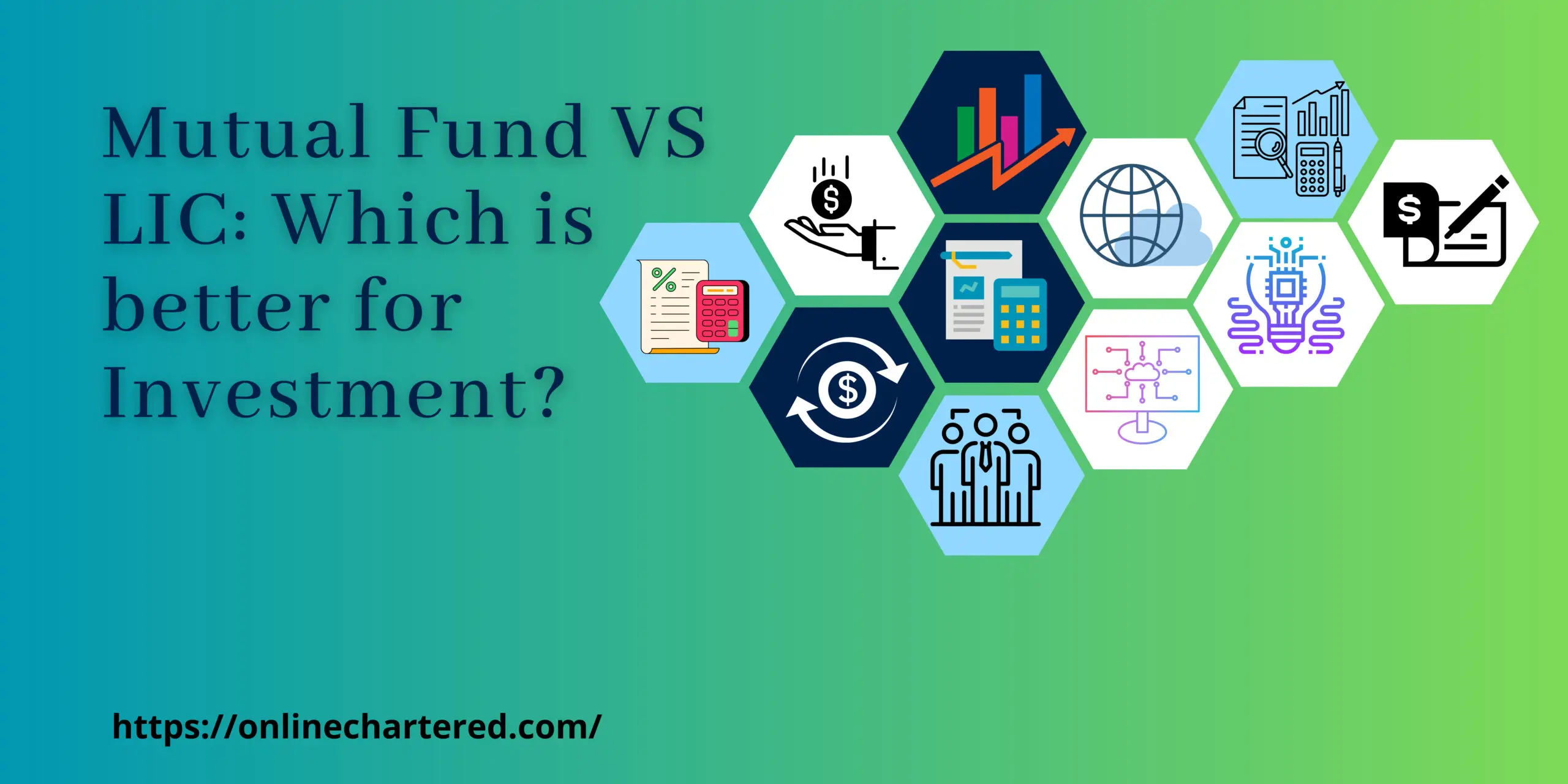Mutual Fund vs LIC: Which is best?

Introduction of Mutual Fund vs LIC:
Individuals have a wide range of investment possibilities open to them. Mutual funds (MFs) and Life Insurance Corporations (LIC) are both popular investment vehicles. Understanding the distinctions and characteristics of different investment vehicles can assist investors in making sound judgments. We will evaluate mutual funds vs LIC in terms of their nature, returns, risk factors, and suitability for various financial goals.
Mutual Funds (MFs):
Mutual funds are investment vehicles that pool money from multiple investors and invest in stocks, bonds, or other assets. Here are some key aspects of MFs:
- Nature: Mutual funds offer investors the opportunity to participate in various market segments, such as equity funds, debt funds, hybrid funds, and more. They provide diversification, professional management, and liquidity.
- Returns: MF returns are market-driven and dependent on the performance of the underlying assets. Investors can earn returns through capital appreciation, dividends, or interest income, depending on the type of fund.
- Risk Factors: The risk associated with MFs varies based on the type of fund. Equity funds tend to have higher risk due to market fluctuations, while debt funds carry lower risk but offer relatively lower returns.
- Suitability: MFs are suitable for investors with a moderate risk appetite and a long-term investment horizon. They are ideal for individuals looking for diversification and professional management of their investments.
Types of Mutual Funds:
Equity Funds
Equity funds invest primarily in stocks of publicly traded companies. They carry a higher risk but have the potential for higher returns over the long term. Ideal for investors seeking capital appreciation.
Debt Funds
Debt funds primarily invest in fixed-income instruments such as government bonds, corporate bonds, and debentures. They provide stable income and are relatively lower in risk compared to equity funds.
Hybrid Funds
Hybrid funds invest in a mix of equity and debt instruments. They offer a balanced approach, suitable for investors seeking both capital appreciation and income generation.
Index Funds
Index funds replicate a specific stock markets index, such as the Nifty 50 or Sensex. They aim to deliver returns similar to the index they track and are considered passive investment options.
Sector Funds
Sector funds focus on specific sectors like technology, healthcare, or energy. They allow investors to concentrate their investments in specific industries but carry higher risks.
Tax-Saving Funds (ELSS)
Equity Linked Savings Schemes (ELSS) are tax-saving mutual funds that offer tax benefits U/S 80C of the Income Tax Act. They have a lock-in period of three years and provide potential long-term growth.
Life Insurance Corporation (LIC)
LIC is a renowned insurance company that offers various life insurance policies and investment options. Here are some key aspects of LIC: LIC, short for Life Insurance Corporation, is a state-owned insurance group in India. It is one of the largest life insurance companies in the country and offers a wide range of life insurance policies to cater to the diverse needs of individuals and families.
- Nature: LIC policies provide life insurance coverage along with an investment component. Policyholders pay regular premiums, and a portion of the premium is allocated towards life insurance coverage, while the remaining amount is invested.
- Returns: LIC policies offer guaranteed returns, as specified in the policy terms. The returns are generally lower compared to MFs or other market-linked investments. However, LIC policies provide a safety net and long-term financial security.
- Risk Factors: The risk associated with LIC policies is relatively lower compared to market-linked investments. Policyholders are protected by the life insurance coverage provided by LIC.
- Suitability: LIC policies are suitable for individuals seeking life insurance coverage with an investment component. They are often preferred by individuals who prioritize safety, stability, and long-term financial planning.
LIC Policies and Benefits:
Endowment Plans
Endowment plans offered by LIC provide both insurance coverage and savings. These policies offer a lump sum payout at the end of the policy term, which can be utilized for various purposes such as education, marriage, or retirement planning. In case of the unfortunate demise of the policyholder during the policy term, the sum assured is paid to the nominee.
Term Insurance Plans
Term insurance plans are pure protection plans offered by LIC. These policies provide a high life coverage amount at affordable premiums for a specific term. If the policyholder passes away during the policy term, the sum assured is paid to the nominee. Term insurance plans offer financial security and protection for the family in case of any unfortunate event.
Unit Linked Insurance Plans (ULIPs)
ULIPs offered by LIC combine the benefits of insurance and investment. These plans allow policyholders to invest in a variety of funds such as equity, debt, or balanced funds, based on their risk appetite and financial goals. ULIPs provide life coverage as well as the potential for wealth creation through market-linked returns.
Money Back Plans
Money-back plans are offered by LIC and are designed to provide periodic payouts to the policyholder during the policy term. These plans provide a regular income stream and can help meet financial obligations or fulfill short-term goals. In case of the unfortunate demise of the policyholder, the full sum assured is paid to the nominee.

Choosing Between MFs and LIC:
| Features | Mutual Funds | LIC (Life Insurance Corporation) |
| Investment | Pooling money from multiple investors into a diversified portfolio of stocks, bonds, or other securities. | Premium payment towards an insurance policy with a savings or investment component. |
| Risk | Can be subject to market volatility and fluctuation in the value of underlying assets. | Generally offers guaranteed returns and lower risk due to insurance coverage. |
| Returns | Returns are based on the performance of the underlying assets and market conditions. | Offers assured returns along with bonuses declared by LIC. |
| Flexibility | Offers various types of funds with different risk profiles and investment objectives. Investors can choose as per their risk tolerance and investment goals. | Provides limited flexibility in terms of investment options and policy terms. |
| Liquidity | Generally offers high liquidity, allowing investors to redeem their units and exit the investment as per market conditions. | Usually has a lock-in period, restricting access to funds for a certain period. Partial withdrawals may allow under specific circumstances. |
| Tax Benefits | Offers tax benefits under Section 80C of the Income Tax Act for certain types of mutual funds, such as ELSS (Equity Linked Saving Scheme). | Provides tax benefits under Section 80C and Section 10(10D) of the Income Tax Act for premiums paid and maturity proceeds, respectively. |
| Insurance Cover | Does not provide insurance coverage. Focuses on investment growth. | Provides life insurance coverage along with the investment component. The coverage amount depends on the policy and premium paid. |
Conclusion:
Understanding the types of mutual funds and LIC policies is crucial for making sound investment decisions. Mutual funds provide investment opportunities with varying risk levels but LIC offers life insurance coverage with savings and investment options. Evaluating the investment approach, risk management, and potential returns can help individuals choose the right investment route aligned with their financial goals and risk tolerance. To know more about this contact our team experts.

How to Improve Credit Score?
Are you looking to improve your credit score? Having a good credit score is essential for financial stability and can open up opportunities for better loan terms, lower interest rates, and increased access to credit. Whether you’re planning to buy a house, apply for a credit card, or secure a loan, a higher credit score …
How to Improve Credit Score? Read More »
Online Chartered
June 29, 2023

Capital Gain on Shares
In this article, the information is about capital gains on shares, providing you with valuable insights and strategies to maximize your profits. Whether you are a seasoned investor or just starting, understanding the nuances of Capital Gain on Shares is essential for achieving financial success. Understanding Capital Gains on Shares What Are Capital Gains? Capital …
Capital Gain on Shares Read More »
Online Chartered
June 26, 2023

The Impact of Technology on business
Introduction In today’s fast-paced world, technology plays a crucial role in shaping and transforming businesses across various industries. From small startups to large corporations, the impact of technology on business operations is undeniable. In this article, we will see how technology has revolutionized the business landscape and discuss its implications for companies worldwide. Automation and …
The Impact of Technology on business Read More »
Online Chartered
June 22, 2023
